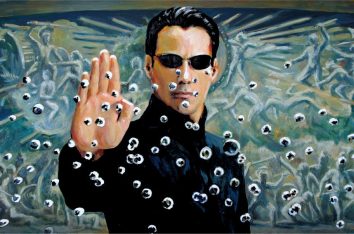We are at the point in our series where we are considering the “death of God,” and I would be remiss if we didn’t pause and reflect upon Dietrich Bonhoeffer’s remarks on what he called “Christianity come of age.”
In a letter to his friend Eberhard Bethge written from prison on April 30, 1944, Bonhoeffer reveals that what “keeps gnawing” at him is the question, “What is Christianity, or who is Christ actually for us today?” He continues by suggesting that the meaningfulness and relevance of traditional religion have largely expired, and that the days when a “religious a priori” was needed to ground and justify disciplines like science or ethics are over. Since, Bonhoeffer says, “even the Western form of Christianity [is] only a preliminary stage of a complete absence of religion,” the question then becomes “what, then, is religionless Christianity” [if such a thing can exist in the first place]?
Bonhoeffer continues:
“Religious people [resort to speaking about] God at a point where human knowledge is at an end (or sometimes when they’re too lazy to think further), or when human strength fails. Actually, it’s a deus ex machina that they’re always bringing on the scene, either to appear to solve insoluble problems or to provide strength when human powers fail.”
The term deus ex machina (“God from the machine”) goes all the way back to theatrical performances in ancient Greece. If the playwright sought to resolve some conflict or difficulty in a lazy way, he would simply have a god lowered down from above to just magically fix the problem. (A contemporary example would be in the Star Wars film The Force Awakens when a few of the good guys are attempting to override an enemy base’s security system in order to break in, and when things prove too difficult, one of them says, “Maybe we could just use the Force?” to which another replies, “That’s not how the Force works!”)
Bonhoeffer concludes, “Inevitably that lasts only until human beings become powerful enough to push the boundaries a bit further and God is no longer needed as a deus ex machina.” In other words, the so-called “God of the gaps” is only relevant if we actually have a bunch of gaps in our knowledge. But as the gaps disappear, so does the need for a deus ex machina to fill them. Simply put, we know (now) that crops don’t fail because the townsfolk profane the Sabbath, and that thunder isn’t caused by God clearing his throat. We simply don’t need a “God” to explain all the mysteries of life and nature, because there really aren’t that many left.
Hence Bonhoeffer’s question amounts to, “What is God even for now?”
Since “as a working hypothesis for morality, politics, and the natural sciences, God has been overcome and done away with (also as a working hypothesis for philosophy and religion),” it is now “a matter of intellectual integrity to drop this working hypothesis, or eliminate it as far as possible,” Bonhoeffer insists (letter to Bethge, July 16, 1944).
Bonhoeffer’s conclusion, shocking as it sounds coming from a Lutheran theologian, is that “we cannot be honest unless we recognize that we have to live in the world [as if God does not exist]” (esti deus non daretur).
“God himself compels us to recognize it. Thus our coming of age leads us to a truer recognition of our situation before God. God would have us know that we must live as those who manage their lives without God.”
As we will see in our next article, however, this is the furthest thing from the crass (and boring) materialism of the so-called New Atheists. Far from a denial or dismissal of the cross of Christ, it is by means of the cross itself that the death of God can result in his being poured out and emptied into the world as Immanuel, “God with us.”



